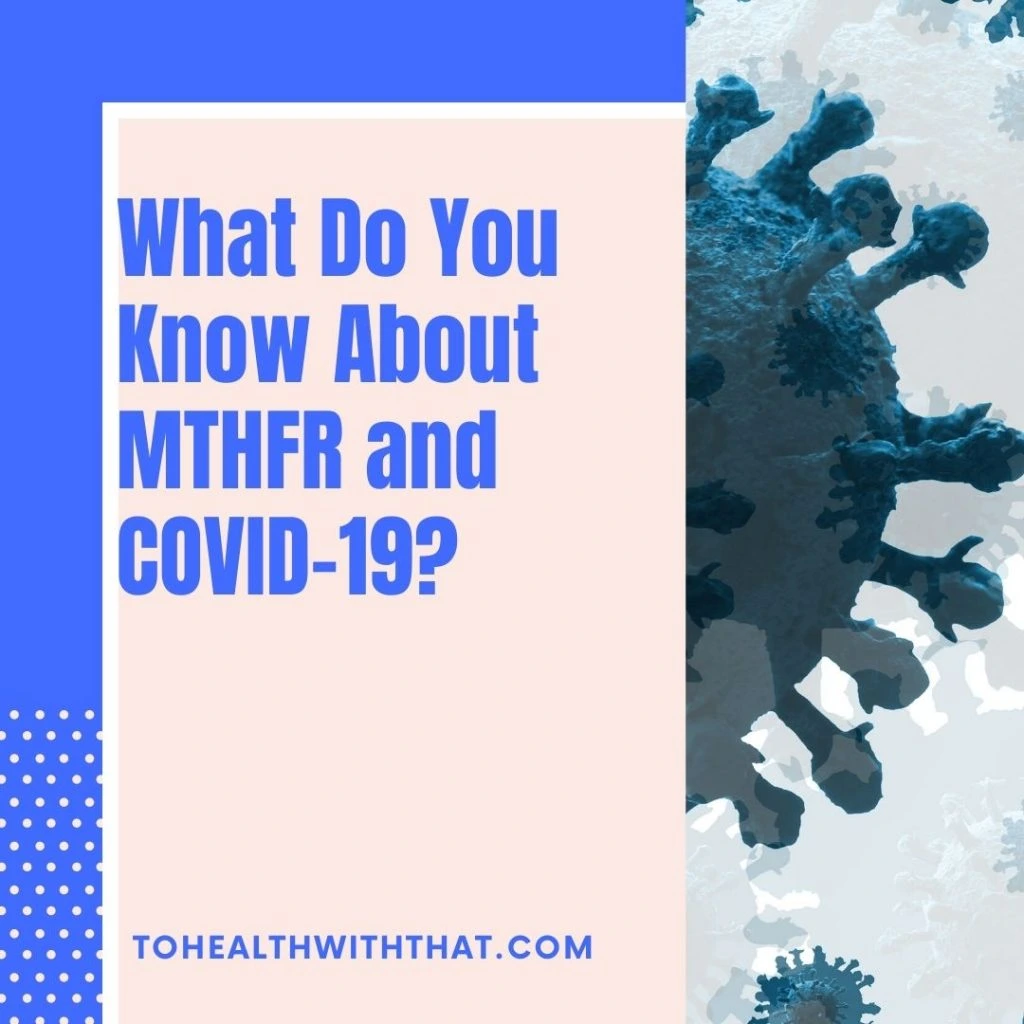Of course in a pandemic we all want to know how it might affect us specifically, with all of our genetic differences. That research takes time and money and usually comes after the big stuff (like how does this spread and why does it kill people.)
In good-ish news, Covid-19 has now officially been around long enough for some of the smaller, more specific areas of research to be done. This includes the very first steps on research into the interplay between homocysteine, MTHFR and covid 19.
This particular study came about because there have been big differences in COVID disease severity, in particular in the death rate, between different geographic areas as well as between the genders. The study I am talking about was published in November 2020 in a journal called Medical Hypotheses, which is not peer-reviewed research, but rather includes important theoretical papers, so I do want to emphasize that this information is theoretical and has not been formally researched yet.

At the date of publication of this research, Covid-19 was associated with an 8.8% mortality rate in those above 60 years of age, and 0.46% for patients aged below 60 years old. Countries with the highest mortality rates are Italy, Spain, France, Iran, and the USA. A recent report from Italy showed that the vast majority of those infected who were critically ill were older men, 68% of whom had at least one comorbidity. The worldwide mortality rate is higher among men almost by a factor of two.
Mortality rate Male:Female = 1.7:1
In Italy, high rates of ICU admission, ICU mortality, and overall mortality have been seen and the deaths from COVID-19 are often associated with high neutrophils, high levels of pro-inflammatory cytokines, abnormal coagulation tests, and disseminated inter vascular coagulation.
The most common comorbidities among the most critically ill were:
- Hypertension
- Cardiovascular disease
- Hypercholesterolemia
- Diabetes
The article goes on to summarize the high points of MTHFR:
- The MTHFR enzyme is the most important in the methionine pathway.
- It regulates fundamental processes such as DNA repair, neurotransmitter function, and membrane transport.
- The C677T mutation has been suggested to be protective against certain cancers including colon and acute lymphatic leukemia.
- The mutation leads to a thermolabile variant of the MTHFR enzyme in which the dissociation rate of the cofactor Flavin Adenine Dinucleotide (FAD) (this is from B2) is increased, thus reducing the activity of the MTHFR enzyme by 50% or more.
- In people with a medium skin tone, the function of the MTHFR enzyme is largely preserved as long as they have sufficient dietary folate intake.
- With insufficient folate intake, the production of 5-LMTHF is reduced, which leads to the accumulation of the key metabolite, homocysteine, to toxic levels.
- MTHFR is the most common genetic cause of hyperhomocysteinemia.
- Low folate status resulted in significantly higher levels of homocysteine in men.
- Research suggests that the C677T mutation is associated with a significantly increased risk of coronary artery disease only in homozygous men.
Other risk factors for the development of high homocysteine are:
- chronic kidney failure
- hypothyroidism
- cancers of the breast, ovary, and pancreas
- smoking
- alcohol consumption
- physical inactivity
- advanced age
- male gender

Acute High Homocysteine
In addition to the risks of high homocysteine that we have talked about before, an acute high homocysteine situation can be triggered, independent of folate status, when a systemic inflammatory process is triggered (like, for instance, by a virus). This process boosts inflammation and releases a tremendous amount of reactive oxygen species (free radicals), which can overwhelm your antioxidant defense systems. This is potentially an even greater issue in MTHFR folks because we have the potential for lower glutathione than average. This whole ugly cascade activates something called nuclear transcription factor (or NF-kB), which accelerates viral replication in SARS Co-V. The study also cites a case report in which glutathione supplementation led to a rapid symptom improvement in two cases of Covid-19.
Interestingly, COVID-19 patients’ plasma homocysteine levels show predictive value for the progression of pathological findings on chest CT. This means the higher the patient’s homocysteine is, the more likely they are to show damaging changes in their lung tissue on a chest CT scan. Also, these changes began to show at a lower homocysteine level than the one that is usually used as a medical reference. Negative changes began to show at 10.58 umol/L rather than the 15 umol/L that is normally recognized as a “high” value.
In Covid-19 patients, the higher the patient’s homocysteine is, the more likely they are to show damaging changes in their lung tissue on a chest CT scan.
– Karst M, Hollenhorst J, Achenbach J. Life-threatening course in coronavirus disease 2019 (COVID-19): Is there a link to methylenetetrahydrofolic acid reductase (MTHFR) polymorphism and hyperhomocysteinemia?. Med Hypotheses. 2020;144:110234. doi:10.1016/j.mehy.2020.110234
-(Paraphrased by Amy Neuzil at tohealthwiththat.com)
What Do We Do About High Homocysteine, MTHFR and Covid-19?
This study makes some suggestions.
- Patients at high risk with Covid-19, such as the elderly with comorbidities, should also be screened for high homocysteine.
- Those with 8 umol/L Homocysteine or above should implement a folate-rich whole foods diet (fruit, vegetables, whole grains, good protein sources.)
- These individuals should also add 5-MTHF supplementation.
- Folic acid should be avoided by these individuals as supplementation can have the opposite of the desired effect, especially in individuals with the MTHFR polymorphism. This is thought to be because unmetabolized folic acid accumulates, which inhibits MTHFR and also folic acid competes at binding sites with 5-MTHF.
- B6, B12, and B2 should be added as well as they are cofactors for the MTHFR enzyme, or in the methionine pathway.
- Supplements with demonstrated anti-viral properties can be added, including vitamins A, C, D, E, selenium, zinc, iron, and omega-3 fatty acids.
- Strong antioxidants including vitamin C and glutathione have shown positive results for Covid-19 outcomes.

At the end of the day, it looks like taking care of yourself appropriately for MTHFR and following the positive steps to balance your methylation that we have been talking about, is actually the best defense for those of us with MTHFR against the worst of the outcomes with Covid-19. Taking positive steps to manage your MTHFR doesn’t mean that you won’t get Covid-19, but hopefully, it will help to reduce your risk of dying from Covid-19. Keep in mind that this study represents a well-researched theory, and it has yet to be proven in clinical trials.
MTHFR is a common genetic mutation that can contribute to anxiety, depression, fatigue, chronic pain, infertility, and more serious conditions like breast implant illness, heart attack, stroke, chronic fatigue syndrome, and some types of cancer. If you know or suspect you have an MTHFR variant, schedule a free 15-minute meet-and-greet appointment with MTHFR expert Dr. Amy today.
Book Your Appointment
